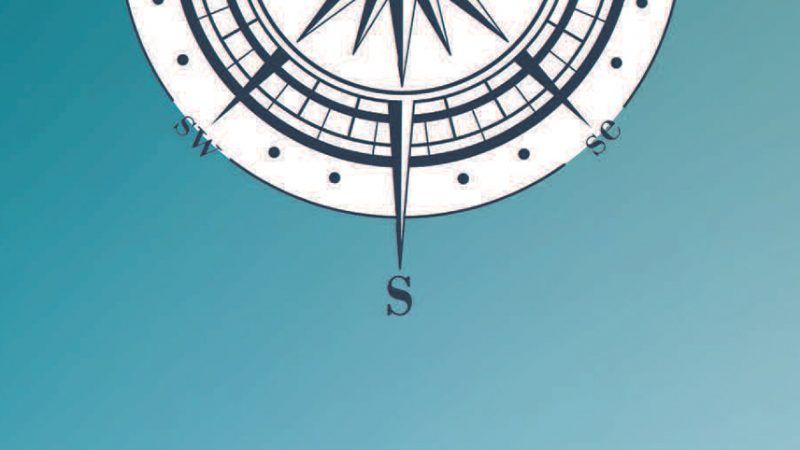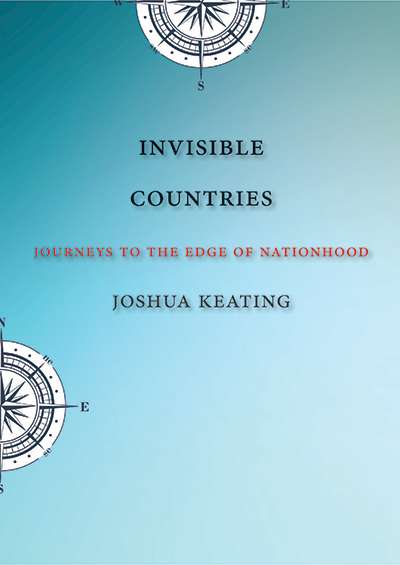People Without Nations, Nations Without People
The future of the Westphalian system is full of unanswered questions.

Invisible Countries: Journeys to the Edge of Nationhood, by Joshua Keating, Yale University Press, 296 pages, $26

You are, I am confident in declaring, reading this within the boundaries of a nation. Virtually every square inch of land on the planet (with the partial exception of Antarctica) has been assigned to one polity or another—as have the world's people. We are all citizens of a country. That is the easily digested story we have been told since childhood.
Almost as easy to understand is the answer to the question, "What if you don't like the country you're in?" You can leave it for another country, or you can make a new one. The history of the last century is rife with examples of peoples creating new states: There's Yugoslavia. There's the cluster of countries where Yugoslavia used to be. If the map doesn't suit you, then draw a new line on it.
In Invisible Countries: Journeys to the Edge of Nationhood, Joshua Keating looks closely at this simple story—and shows not only that the accepted narrative does not capture the true shape of the world but that the consensus underneath that narrative is eroding. A brief and historically anomalous period of stable international borders is coming to an end.
Keating, formerly of Foreign Policy and now of Slate, begins by exploring the emergence of the modern nation-state. He moves from the Treaty of Westphalia, which undergirds much of modern international law, to the U.S. Declaration of Independence and then onward to colonialism, Wilsonian self-determination, the Cold War, and our current era. This opening flirts with some fascinating questions, but cramming such a huge swath of political history into 40 pages doesn't leave room for thorough answers. Keating arrives too abruptly at Westphalia, and he limits himself to Europe. He doesn't give 19th century nationalism room to breathe. He notes the stability of the Cold War era without discussing the period's nuclear stalemate or the growth of international trade and soft power.
Having briskly set the stage, the author brings out a parade of curiosities. First are the Knights of Malta, a relic of the medieval era that maintains the trappings of sovereignty (strained even further since Pope Francis has imposed his authority on the order) without any territory except a couple of embassies. He visits Akwesasne, a Mohawk community that spans the U.S.-Canada border and tries to balance the authority of both states with its own. He muses on the case of Somaliland, a poor but stable country attempting to secede from Somalia against the wishes of the world community, which fears a repeat of the disaster in South Sudan. He registers as an "electronic resident" of Estonia. He meets with the self-proclaimed president of Liberland, a small parcel of land on the Serbia-Croatia border that neither state claims and that Liberland's libertarian founder therefore asserts is terra nullius and subject to his territorial control.
These examples are exceptions that prove the rule. The Westphalian system has withstood much stronger threats, and the book begins picking up its pace as it moves toward a crisis that might equal the greatest challenges the nation-state has faced.
The strongest sections of Keating's tour come as he slows down to examine larger questions. He's on familiar ground talking about Kurdistan, the prototypical "nation without a state," and it shows. He walks deftly through the confusing web of conflicting loyalties and authorities in the Kurdish parts of Iraq and Syria. He looks at the interests of the major players in the region, and at their attempts to deny or encourage Kurdish aspirations. Arab refugees from the war against ISIS have swelled the populations of Iraqi Kurdistan and Syrian Rojava, even as the Kurds in those two places have vastly expanded the size of the territories they hold.
A fascinating aside on the stateless people of the world ultimately leaves the reader asking questions. Keating introduces individuals without nations, such as those born in the Soviet Union who never applied for citizenship in one of its successor states. What about the growing global refugee population—is a Kurd fleeing Syria still a Syrian? What about her child, born in Greece? The book, which includes some events from 2017, does not mention the Rohingya crisis on the Bangladesh-Burma border, which dramatically highlights this problem. Keating also glosses over Palestine, the world's most prominent nation without a state.
As flaws go, there are worse ones than raising interesting questions that aren't fully answered, but this happens again and again throughout the book. A breezy visit to Abkhazia doesn't do enough to explore a rising trend: Russia's exploitation of nationalist rivalries to maintain a shadow of the buffer zone it enjoyed in the days of the Russian Empire and then the USSR. Putin maintains a military presence in South Ossetia and Abkhazia, republics unrecognized in the West and carved out of the republic of Georgia. The same playbook was followed to carve Transnistria out of Moldova, to carve Lugansk and Donetsk out of Ukraine, and even to assist Armenia in carving Nagorno-Karabakh out of Azerbaijan. The Russian annexation of Crimea was the culmination of this campaign, although whether it is the end is far from certain.
The rise of conflicting world maps—just as Western maps refuse to acknowledge Transnistria, maps in Russia do not recognize Kosovo's secession from Serbia—is worrying. A border that moves depending on who's telling you where it belongs is nothing new, but in a world where borders are as stable as they have ever been, any threat appears large. Keating touches on this briefly as he discusses the Spratly Islands, where China is literally building up its presence by constructing thousands of acres of new land. International law doesn't recognize a claim to an exclusive economic zone based on artificial islands, but by building on existing reefs China is attempting an end-run that, backed by a lot of money and the diplomatic clout it buys, will succeed, at least in the short term.
Meanwhile, some natural islands are disappearing. Keating ends his tour in Kiribati, a vast nation of low-lying atolls and islands that could become uninhabitable within decades as oceans rise. Having purchased land in Fiji, its plans to continue as a government without a territory are starting to ripple through international law. Can the Kiribati people maintain some sort of virtual citizenship? Once in exile, will they keep their seat at the U.N. and other bodies? Can they retain political and economic control over what amounts to a seabed? Will international law change to recognize artificial islands built on a country's former site? The academic question of a nation-state without a state could become less academic sooner than we think.
That leads us to Keating's last and largest question: How might changes in the physical world impact the political world? As coastlines and climates change over the coming decades, people will move and bring with them a host of new dilemmas. How will today's powers react to tomorrow's crises?
Here again, Keating asks more than he answers. He gives lavish attention to the eccentrics, romantics, and rebels challenging the simple narrative of the nation-state, but not to their opponents. We're told the African Union opposes the adjustment of borders, but we never meet anyone who works there. We're told the United States uses its influence to discourage secession, but Keating never talks with a diplomat, a World Bank official, or anyone else deploying hard and soft power to maintain the status quo. It's like a movie whose villain is never on the screen.
This omission highlights another issue: The book devotes almost no attention to the real power of the nation-state. The anthropologist and political scientist James C. Scott has shown how lines on maps do not always translate into the lived reality of states' subjects. At the same time, treaties and trade pacts have eroded the legal boundaries between nations while globalization and the digital revolution have made the world much smaller. As states are threatened by a more homogenized world culture, by rivals that provoke with impunity within their borders, and by the logic of a market that demands an endless, frictionless flood of goods and services across borders, it is little wonder that a populist reaction has arisen. Keating does frustratingly little to digest all this.
Despite such flaws, Invisible Countries is a worthwhile read. It challenges ideas that have long lived as quiet assumptions in our heads. It suggests that things will change soon—that the minor flaws with and exceptions to the Westphalian system are not aberrations but harbingers. Keating never settles long enough on any one point to give truly satisfying answers. But if his book ultimately leaves too many questions open, it remains a useful starting point for the discussions we must begin.
